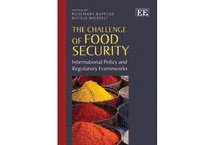6 Nov 2012 Books/ Book Chapters
The WTO and Food Security: What’s Wrong with the Rules?

Article by Christian Häberli in The Challenge Of Food Security. International Policy and Regulatory Frameworks, (eds.) Rosemary Rayfuse and Nicole Weisfelt , Edward Elgar Publishing, 2012.
The WTO Agreement on Agriculture (AoA) is the predominant multilateral legal framework governing agricultural trade. The objective of the AoA is to liberalise trade in agriculture through reductions in tariffs, domestic support and export subsidies. The AoA has not, however, ‘levelled the playing field’ and has not resulted in the equitable distribution of food, particularly for the poorer developing countries. On the other hand, support for small farmers does not ensure food security for the poor. While food security has no simple solutions such as “free trade is good for you”, reform proposals for trade rules which only address agricultural policy instruments fail to account for consumer and other interests: neither tariff reductions and subsidy disciplines, nor safeguards and other measures of producer protection can automatically increase food security. Rather, what is needed is the full and proper implementation of a number of commitments which the international community has already entered into in various human rights treaties, but which even the envisaged results of the now failed Doha Round negotiations could not ensure without revisiting relevant multilateral trade and investment rules.<//span>

